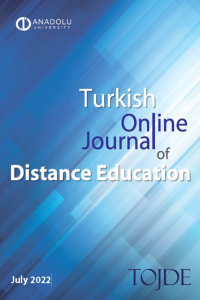Abstract
References
- Aldemir, C., & Gulcan, Y. (2004). Student satisfaction in higher education: A Turkish case. Higher education management and policy, 16(2), 109-122.
- Alemayehu, B. and Solomon M. S., (2017). Historical analysis of the challenges and opportunities of higher education in Ethiopia. Higher Education for the Future, 4(1), 31-43.
- Alves, H., & Raposo, M. (2009). The measurement of the construct satisfaction in higher education. The service industries journal, 29(2), 203-218.
- Ambachew, M. and Mekonnen, T. (2014). Determinants of student and staff satisfaction with services at Dilla University, Ethiopia: Application of single and multilevel logistic regression analyses. Social indicators research, 119(3), 1571-1587.
- Arambewela, R., & Hall, J. (2013). The interactional effects of the internal and external university environment, and the influence of personal values, on satisfaction among international postgraduate students. Studies in higher education, 38(7), 972-988.
- Baguma, P. and Aheisibwe, I. (2011). Issues in African Education. In A. B. Nsamenang and Therese M.S. Tchombe, (eds), Handbook of African Educational Theories and Practices: A Generative Teacher Education Curriculum, PP.21-34. Human Development Resource Centre (HDRC), Cameroon.
- Birhanu, N. W. (2014). The Quality of Evening Education Program at Jimma Teachers’ Training College (JTTC), In Oromia, Ethiopia. European Scientific Journal, 10(28), 312-326.
- Boyer, S. L., Edmondson, D. R., Artis, A. B., & Fleming, D. (2014). Self-directed learning: A tool for lifelong learning. Journal of Marketing Education, 36(1), 20-32.
- Browne, B.A., Kaldenberg, D.O., Browne, W.B., and Brown, D., (1998). Students as customers: Factors Affecting Satisfaction and
STUDENTS’ SATISFACTION WITH THE PRACTICES AND IMPLEMENTATION OF NON-REGULAR EDUCATION PROGRAMS: THE CASE OF HARAMAYA UNIVERSITY, ETHIOPIA
Abstract
The purpose of this study was to assess students’ satisfaction with the practices and implementation of non-regular education programs (NREPs) with particular regard to Haramaya University (HU), Ethiopia. To achieve the aim of the study, an explanatory sequential mixed methods research design, which initially allows collecting quantitative data and then qualitative data for elaboration on the quantitative data, was used. The study used a 5-point Likert scale questionnaire for quantitative inquiries from 741-students belonging to different centres, and follow-up with 20 interview participants purposefully selected to elaborate those results in more detail. In the quantitative phase, four features were considered as predictors of students’ satisfaction with service quality: (a) academic issues, (b) administrative issues, (c) resources/facilities, and (d) assessment and feedback issues. In the qualitative follow-up, the semi-structured interviews outlined three major themes: (a) overall teaching-learning, (b) administrative and management issues, and (c) learning support facilities. The paper used descriptive statistics to interpret the quantitative data and thematic content analysis to interpret the qualitative data. The findings are presented sequentially following the order of the analysis of quantitative and qualitative data presented in the paper. The conclusions and relevant recommendations are also stated at the end of the paper.
Keywords
Haramaya University higher education non-regular education programs service quality student satisfaction.
References
- Aldemir, C., & Gulcan, Y. (2004). Student satisfaction in higher education: A Turkish case. Higher education management and policy, 16(2), 109-122.
- Alemayehu, B. and Solomon M. S., (2017). Historical analysis of the challenges and opportunities of higher education in Ethiopia. Higher Education for the Future, 4(1), 31-43.
- Alves, H., & Raposo, M. (2009). The measurement of the construct satisfaction in higher education. The service industries journal, 29(2), 203-218.
- Ambachew, M. and Mekonnen, T. (2014). Determinants of student and staff satisfaction with services at Dilla University, Ethiopia: Application of single and multilevel logistic regression analyses. Social indicators research, 119(3), 1571-1587.
- Arambewela, R., & Hall, J. (2013). The interactional effects of the internal and external university environment, and the influence of personal values, on satisfaction among international postgraduate students. Studies in higher education, 38(7), 972-988.
- Baguma, P. and Aheisibwe, I. (2011). Issues in African Education. In A. B. Nsamenang and Therese M.S. Tchombe, (eds), Handbook of African Educational Theories and Practices: A Generative Teacher Education Curriculum, PP.21-34. Human Development Resource Centre (HDRC), Cameroon.
- Birhanu, N. W. (2014). The Quality of Evening Education Program at Jimma Teachers’ Training College (JTTC), In Oromia, Ethiopia. European Scientific Journal, 10(28), 312-326.
- Boyer, S. L., Edmondson, D. R., Artis, A. B., & Fleming, D. (2014). Self-directed learning: A tool for lifelong learning. Journal of Marketing Education, 36(1), 20-32.
- Browne, B.A., Kaldenberg, D.O., Browne, W.B., and Brown, D., (1998). Students as customers: Factors Affecting Satisfaction and
Details
| Primary Language | English |
|---|---|
| Journal Section | Articles |
| Authors | |
| Publication Date | July 1, 2022 |
| Submission Date | June 26, 2021 |
| Published in Issue | Year 2022 Volume: 23 Issue: 3 |


